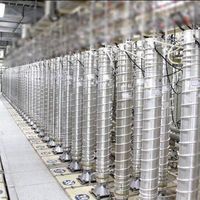Iran denies FM discussed possible US talks during Qatar trip
Iran's foreign ministry said on Monday that its senior diplomat, Abbas Araghchi, did not discuss negotiations with the United States during a recent visit to Doha.
Esmail Baghaei said the trip was within the framework of Iran-Qatar relations, emphasizing that Araghchi met with senior Hamas officials to review developments in Palestine.
“No specific discussion was raised regarding any other issue,” Baghaei said during a press conference on Monday, as reported by ILNA.
Iran and the US have not had diplomatic ties since 1980.
Araghchi traveled to Qatar last week, where he had discussions with Qatari Prime Minister and Foreign Minister Sheikh Mohammed bin Abdulrahman bin Jassim Al Thani.
Tehran has conveyed conflicting messages about its openness to negotiate with Washington following Donald Trump's re-emergence in politics.
Iran’s Supreme Leader Ali Khamenei said on Sunday "Death to America" during a gathering at his headquarters after having tacitly given the go-ahead to talks with the US.
Tehran took part in indirect talks with the Biden administration between 2021 and 2022, to restore US involvement in the nuclear agreement which was inked in 2015 following Trump’s 2018 withdrawal and the imposition of strict sanctions. However, the Vienna talks failed to reach a result.
Regional ties and policy toward Afghanistan
Beyond the Qatar trip, Baghaei addressed Iran's diplomatic outreach to Afghanistan, saying the foreign minister’s visit to Kabul followed a steady course of engagement over the past four years.
“We have many things in common with them, and we hope these shared interests will serve as a basis for resolving outstanding issues, such as water rights,” he said.
The water dispute between Tehran and Kabul centers on the Helmand River, which originates in Afghanistan and flows into Iran. A 1973 treaty was designed to regulate water-sharing, guaranteeing Iran an annual quota of 820 million cubic meters.
However, Iran has accused Afghanistan—particularly under the Taliban—of violating the agreement by restricting water flow through dam projects like the Kamal Khan Dam. Afghan authorities, on the other hand, say climate change and persistent drought have reduced the river’s capacity, making it difficult to meet Iran’s expectations.
Sweden's arrest of cleric
During the trip, Baghaei also condemned Sweden’s detention of a senior Iranian cleric, describing the arrest as politically motivated. He said the move was influenced by “third parties that do not seek to benefit either us or Sweden.”
“Our inherent duty is to protect Iranian citizens,” he said. “He has not committed a crime, and this action is incompatible with legal principles.” Baghaei added that Iran had lodged a formal protest, and the Swedish ambassador had been summoned to the foreign ministry.
The Swedish daily Expressen reported on Saturday that an Iranian cleric, Mohsen Hakimollahi, serving as an imam at an Islamic center in suburban Stockholm, has been detained for nearly two weeks and faces deportation from Sweden. No specific reason was reported for the arrest.
Hakimollahi, 63, was originally transferred from Iran to Sweden to manage the Imam Ali Center and had lived in the country for several years, establishing ties with local political figures and religious organizations.
Later on Monday, Iran’s Foreign Ministry summoned Sweden’s ambassador over the arrest.







